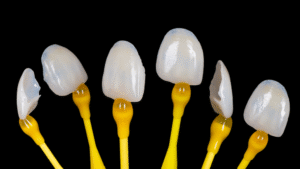A dental crown is a versatile solution for restoring damaged, decayed, or weakened teeth. It acts as a cap, covering the tooth entirely to protect and enhance its appearance and function. If you’re considering getting a dental crown, you may be wondering about the cost and the factors that influence it. This guide explores everything you need to know about dental crowns, including the process, types, and key considerations affecting their price.
What Is a Dental Crown?
A dental crown is a custom-made cap that fits over an existing tooth or dental implant. Crowns are used for several purposes, such as:
- Restoring a cracked, chipped, or worn tooth.
- Covering a tooth with a large filling that weakens its structure.
- Protecting a tooth after a root canal procedure.
- Improving the appearance of a discolored or misshapen tooth.
- Serving as part of a dental bridge or implant.
Crowns are available in various materials, each with unique benefits and considerations.
Types of Dental Crowns
Choosing the right type of crown depends on your dental needs, budget, and aesthetic preferences. The most common types include:
1. Porcelain or Ceramic Crowns
Porcelain crowns are popular for their natural appearance and ability to blend seamlessly with surrounding teeth. They are often used for front teeth where aesthetics are important.
2. Metal Crowns
Metal crowns, often made of gold or other alloys, are incredibly durable and resistant to wear. They are ideal for molars that endure heavy chewing forces.
3. Porcelain-Fused-to-Metal (PFM) Crowns
These crowns combine the strength of metal with the natural look of porcelain, making them suitable for both front and back teeth.
4. Zirconia Crowns
Zirconia crowns offer both durability and a tooth-like appearance. They are increasingly popular due to their strength and aesthetic appeal.
5. Resin Crowns
Resin crowns are typically less expensive but may not be as durable as other options. They are often used as temporary crowns.
Factors That Influence the Cost of Dental Crowns
Several factors contribute to the overall cost of a dental crown. These include:
1. Material
The type of material used for the crown significantly affects the price. For instance, porcelain and zirconia crowns tend to be more costly than resin or metal crowns due to their appearance and durability.
2. Location of the Tooth
Crowns for front teeth often require more intricate craftsmanship to match the natural teeth, which can increase the cost.
3. Dentist’s Expertise
The experience and reputation of your dentist or specialist can influence the pricing.
4. Geographic Location
Costs may vary depending on the region and local dental practices.
5. Additional Procedures
The need for preparatory treatments, such as a root canal, tooth reshaping, or gum contouring, can add to the overall cost.
The Dental Crown Process
The process of getting a dental crown usually involves multiple steps spread over two visits:
1. Initial Consultation
Your dentist evaluates the tooth, takes X-rays, and discusses the best crown material and treatment plan.
2. Tooth Preparation
The dentist shapes the tooth to accommodate the crown. If necessary, a temporary crown is placed to protect the tooth until the permanent one is ready.
3. Impression or Scan
An impression or digital scan of your tooth is taken to create a custom-fitted crown.
4. Crown Fabrication
The crown is crafted in a dental lab using the selected material. This process typically takes a few weeks.
5. Crown Placement
During the final visit, the dentist removes the temporary crown and secures the permanent one with dental cement. Adjustments are made to ensure a comfortable fit and proper bite alignment.
Benefits of Dental Crowns
Dental crowns offer numerous advantages, including:
- Restoring the function of damaged teeth.
- Improving the appearance of your smile.
- Protecting teeth from further damage or decay.
- Providing long-lasting results with proper care.
Caring for Your Dental Crown
Proper care can extend the lifespan of your crown and prevent complications:
- Maintain Oral Hygiene: Brush and floss regularly to prevent decay and gum disease around the crown.
- Avoid Hard Foods: Refrain from biting into hard objects or foods that can damage the crown.
- Regular Dental Visits: Schedule routine check-ups to ensure the crown remains in good condition.
- Wear a Nightguard: If you grind your teeth, a nightguard can protect your crown from excessive wear.
Hummingbird Dental: Richmond Hill’s Leading Emergency Dental Clinic
When a dental emergency strikes in Richmond Hill, Hummingbird Dental is the clinic you can count on for immediate, high-quality care. Located at 10376 Yonge St #202, Richmond Hill, ON L4C 3B8, Hummingbird Dental is renowned for its responsive and compassionate approach to emergency dental situations. Whether it’s a sudden injury, a painful toothache, or a dental issue that needs urgent attention, the experienced team at Hummingbird Dental is ready to help.
Contact Hummingbird Dental at +1 647-370-2024 or via email at info@hummingbirddental.ca to receive the emergency dental care you need. Their team is dedicated to providing quick and effective treatment to alleviate pain and protect your oral health.
FAQs About Dental Crowns
1. How long do dental crowns last?
Dental crowns can last anywhere from 5 to 15 years, depending on the material, oral hygiene, and habits such as teeth grinding.
2. Are dental crowns painful to get?
The procedure is typically painless, as local anesthesia is used during tooth preparation. Some patients may experience mild sensitivity afterward, but this usually subsides.
3. Can a crown be repaired if it’s damaged?
Minor chips or cracks in a crown can sometimes be repaired. However, significant damage may require a replacement.
4. What’s the difference between a crown and a veneer?
A crown covers the entire tooth, while a veneer only covers the front surface. Crowns are generally used for restorative purposes, whereas veneers are more cosmetic.
5. Are dental crowns covered by insurance?
Many insurance plans partially cover the cost of crowns, especially if they are deemed medically necessary. Check with your provider for specific details.
Conclusion
Dental crowns are a versatile and effective solution for restoring damaged or weakened teeth. While the cost of a crown varies based on factors such as material, location, and preparatory treatments, they are a long-term investment in your oral health and appearance.
If you’re considering a dental crown, consult with your dentist to determine the best material and treatment plan for your needs. By understanding the process and caring for your crown properly, you can enjoy a healthy and functional smile for years to come.










